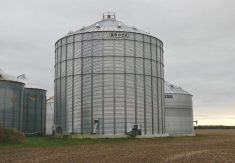The rise of soybeans as a cash crop in and around Manitoba, and the availability of hogs to dine on soy meal, could support Western Canada’s first-ever soybean crushing plant, a new study finds.
The feasibility study, run by Winnipeg-based Mercantile Venture Consulting and backed by the federal and Manitoba governments, shows a Manitoba crushing facility would be economically viable, based on the growth in soybean acreage and the demand for soybean meal.
Where Canada’s soybean production has doubled between 2004 and last year, production in Manitoba and Saskatchewan combined has risen sixfold to form 20.6 per cent of the total Canadian crop, MVC said in its study, released Thursday.
Read Also

Trump signs proclamation increasing Argentine beef imports
U.S. President Donald Trump on Friday signed a proclamation to hike the country’s low-tariff imports of Argentine beef, though economists have said the attempt to lower costs for American consumers will likely have little impact on prices.
Production averages for Saskatchewan, Manitoba, North Dakota and Minnesota combined show soybean production rising at an average of four per cent per year since 2010, the study noted. The four jurisdictions together produced 15.09 million tonnes of soybeans in 2014, with Manitoba and Saskatchewan growing 1.1 million and 160,000 tonnes respectively.
The study further estimates soybean acreage could quadruple in Western Canada over the next decade in response to global demand for soybeans, meal and soyoil. Most soybeans grown in Manitoba are either shipped to the United States or China for processing.
However, while Western Canada now crushes about 10 million tonnes of canola per year, the only Canadian crushers handling soybeans are in Hamilton, Windsor and Trois-Rivieres, MVC noted, and “although the western canola plants could switch to soybean crushing perhaps with small modifications, none do.”
“We have an opportunity to provide more value to growers in Manitoba and it’s always good to have an alternative market that doesn’t rely on exports,” Kyle Friesen, chair of Manitoba Pulse and Soybean Growers, which with soy agency Soy 20/20 helped launch and fund the study.
The two groups said they now plan to “investigate potential stakeholders who may want to construct a soybean crushing facility.”
Based on sufficient soybean supply, a “conservative” forecast for soybean meal marketing in Western Canada and “worst-case scenarios” for freight, a Manitoba crush plant would have a total advantage of $47.58 per tonne over crush plants in the northern U.S., MVC said.
Given total production costs of $47.74 per tonne, the consultancy said, “the combined freight advantage and returns on production show a very good Manitoba gross crush margin at $95.31 (per tonne).”
That said, MVC added, “two major risks remain: a consistent source of sufficient volume of soybeans and the size of future meal markets in Western Canada.”
The study considers the potential for a “single use” soybean crush plant and a “switch” plant that could move to canola once it can’t get enough soybeans. A single-use plant would need a capacity of 2,000 tonnes of soybeans per day or 695,000 per year.
Based on 2014 production, a 2,000-tonne per day plant in Manitoba would have to attract between 37 and 55 per cent of total current Prairie soybean production — and the Prairies’ soybean meal market “would need to be further developed,” the study said.
Existing canola crush plants in Western Canada have the capacity to run as multi-use switch plants but “they do not use it,” MVC added.
The consulting firm’s recommendation specifically calls for a multi-use switch plant designed to crush both soybeans and canola, which could help deal with the risks of soybean supply and meal demand “without losing the important economies of scale,” MVC said. “This allows a maximizing of potential crush margins and keeps soybean meal production within the existing size of the product market.”
A new crush plant “promises a number of net benefits for Manitoba,” the consulting firm said. For one, soybean growers would get “easier access to the market and… the ability to bypass uneven rail freight. It is also likely to generate freight savings and better soybean prices to growers.”
Livestock producers, MVC said, “would equally benefit by gaining a local protein feed supply at competitive prices.” Crush plant owners, meanwhile, could then earn the crush margins for soybeans, “which at the same time would be kept within the provincial borders, rather than being exported to the U.S.”
“We want to encourage local supply and demand to keep value-added processing in Manitoba to support jobs, the tax base and economic activity,” MPSG’s Friesen said Thursday.
MVC’s preliminary partial calculation of direct and spin-off pre-tax benefits is pegged at around $190 million a year. — AGCanada.com Network















